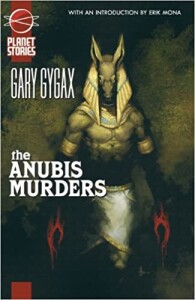 Say what you will about The Anubis Murders, Paizo’s Planet Stories line is a wonderful thing. Dedicated to keeping influential works of science fiction and fantasy in print for a new generation of fans, Planet Stories has resurrected classics like C.L. Moore’s Northwest Smith and Jirel of Joiry stories, Michael Moorcock’s Kane of Old Mars books, and more, all of which deserve to be read and appreciated by today’s audiences. [Disclosure: This reviewer has contributed one short story to an anthology on the Planet Stories imprint; he is also a monthly subscriber to the line, on his own dime.]
Say what you will about The Anubis Murders, Paizo’s Planet Stories line is a wonderful thing. Dedicated to keeping influential works of science fiction and fantasy in print for a new generation of fans, Planet Stories has resurrected classics like C.L. Moore’s Northwest Smith and Jirel of Joiry stories, Michael Moorcock’s Kane of Old Mars books, and more, all of which deserve to be read and appreciated by today’s audiences. [Disclosure: This reviewer has contributed one short story to an anthology on the Planet Stories imprint; he is also a monthly subscriber to the line, on his own dime.]
Mixed in with the Leigh Brackett and Henry Kuttner is one author who’s best known for other work. Gary Gygax, who passed away earlier this year, was of course best known for his work in the creation of Dungeons & Dragons, the tabletop RPG mashup of a dozen literary fantasy tropes that pretty much cemented the notion of heroic fantasy in the public mind. By dint of D&D’s popularity, it’s safe to say that Gygax influenced millions upon millions of readers, and thousands upon thousands of fantasy novels.
But what, then, of the man’s own fiction? The best-known example is the Gord the Rogue series, which followed Gygax when he originally left TSR. Less well known is the series of supernatural alternate-earth mysteries starring Magister Setne Inhetep. Inhetep, for his part, is a Sherlock Holmes type: relentless, brilliant, and unconcerned with social graces. He’s also an extremely powerful magician, a priest of Thoth, and a man with a healthy interest in his young female slave-cum-bodyguard, Rachelle.
The premise of the book starts out promisingly enough, with a pack of too-friendly nobles and magical types from the fair isle of Avillon. They’ve journeyed hundreds of miles to ask Master Inhetep to look into some deeply unpleasant magical murders. The kicker is that the murders seem to implicate the jackal-headed god Anubis, who generally doesn’t go in for that sort of thing. Needless to say, there’s more to this than meets the eye, and all sorts of wacky hijinks ensue.
The problem isn’t with the wacky hijinks, per se. For a pulp pastiche, the plotting isn’t bad, with suitably perilous perils and whatnot. There are two other issues with the book that drag it down from the heights of goofy fun it aspired to.
The first is the writing, which alternates between bombastic declamation and relentless exposition without much in the way of in-between. Gamers everywhere should forgive me for saying this, but you can hear the dungeon master’s voice, trying to explain the setting and plot clearly to his players and forgetting that this time, he’s got readers instead. Too much of the plotting is revealed in character dialogue, rather than action, and too many of those dialogues have the unmistakable twinge of bwah-hah-hah about them.
That ties into the other issue, namely, Magister Inhetep himself. There’s a faint whiff of the Mary Sue about him, the man who’s brighter, tougher, more powerful, and just plain cooler than everyone else. While that sort of thing is de rigeur for a pulp hero – it’s not like Doc Savage wasn’t nine kinds of ubermensch – the best ones always did it within the pre-established parameters of the world. With Inhetep, his power level and relative coolness keep on shifting, depending on the situation he’s in and how powerful he needs to be to come through without a scratch. It feels as if the world, which really means the author, is protecting him from any real possibility of harm, and that drains all of the tension out of what could have been a rollicking good time.
Ultimately, if The Anubis Murders is the low point of the Planet Stories line, then that’s not a bad thing at all. There are certainly worse books out there, and if Gygax’s name draws some roleplayers in to a place where they can discover some of their hobby’s roots, there’s nothing wrong – and a lot right – with that.
(Paizo Planet Stories, 2008)
